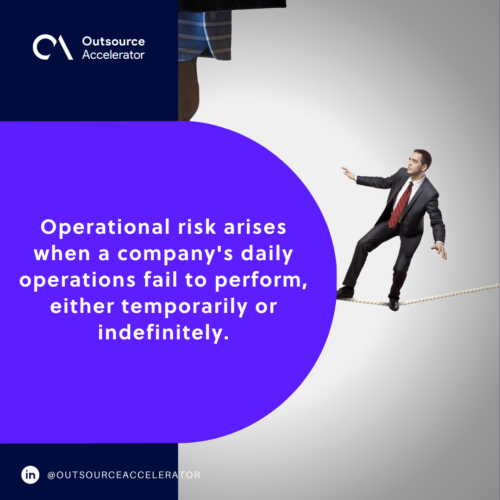Business risk
Definition
What is business risk?
Business risk is any situation that risks making insufficient sales or lowering the profit of a business. It is considered a business risk when a company’s ability to make a profit is threatened.
In business, risk means that an organization’s plan may turn out to be the opposite of what should happen. It can be from internal or external sources.
Business risks are not entirely avoidable. However, companies can take actions and preventive measures to minimize the negative effects.

How to identify business risks?
There are various ways to identify business risks. Companies need to analyze the sources of risks that trigger the problem. After the threat is identified, the company should act immediately and plan risk management.
In addition, managers should involve their employees and train them to identify and handle business risks at their level.
Create a record of risks encountered as they might happen again. By creating records, organizations can do a regular review of past events to detect future business risks.
Types of business risks
Here are some types of business risk your business might encounter in the future:
Strategic risk
When a business does not operate according to its plan, strategic risk can occur. Companies may struggle to reach their goals when it does not function according to its business model.
To know and meet the customers’ demand, businesses need to implement real-time feedback.
These can also help reduce encountering business risks in the future.
Compliance risk
Compliance risk involves companies and businesses that have to comply with new rules and regulations set by the higher authorities.
Businesses that want to completely comply with the law face compliance risks due to the likelihood of management failure.
Operational risk
Operational risk arises when a company’s daily operations fail to perform, either temporarily or indefinitely. While operating, your business can still take steps to prepare precautionary measures.

Financial risk
Financial risk compromises the organization’s financial growth and profitability. Its most typical sources are customers, suppliers, and regulatory obligations.
Financial risks are largely regarded as a component of conducting business, but that doesn’t mean you should avoid them.
Global risk
Working with international, third-party service providers and suppliers might put your business at risk due to issues like bribery.
This implies that any company that wants to establish a business internationally must follow the rules and regulations in the respective countries.







 Independent
Independent




